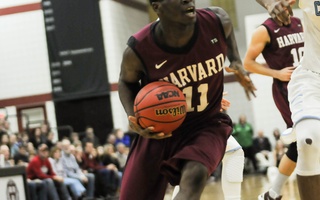{shortcode-7f342d2a5da412bcabb7f7b7f01e16ef10c32d71}
Friday night at Lavietes Pavilion, senior Patrick Steeves wrote his own fairy tale.
On the eve of Senior Night, the forward had a career-high 25 points on 13 baskets, none more important than the two free throws he sunk with seven seconds left that provided the decisive margin in a 73-71 win over Princeton (20-6, 10-2 Ivy). On the Tigers’ last chance to tie, Steeves—who played a total of zero minutes his first three years due to multiple knee and foot surgeries—rejected a Myles Stephens layup before Princeton’s last gasp attempt rolled off the rim.
His ensuing scream of joy could be heard from the rafters.
“I don’t know how to put [the feeling] into words, to be honest,” Steeves said.
The entire game was perfectly tailored to Steeves’ skill set. With Princeton’s only two centers—junior Pete Miller and sophomore Alec Brennan—in constant foul trouble, Tigers coach Mitch Henderson went to uber-small lineups with either the 6’5” Steven Cook or the 6’4” Spencer Weisz playing the five.
Initially, Harvard (12-16, 5-8) feasted. Seniors Evan Cummins and Agunwa Okolie had 16 of Harvard’s first 23 points by repeatedly driving the lane. As Princeton kept getting smaller, Harvard kept extending its lead—Harvard’s 26 first-half points in the paint enabled it to build an eight-point lead at the break.
At the center of the action was Steeves, the versatile wing who leads the team in three-point percentage and ranks second in assists. After Princeton made an 11-0 second-half run to take its first lead, Steeves came back with a three-point play to put Harvard back in front.
After two free throws from Steven Cook tied up the game, the senior was back at it. He had baskets on Harvard’s next three possessions to push the lead to five, backing down smaller Princeton defenders and scoring at will in the paint until Henderson moved Cook, Princeton’s best defender, onto him.
With a bigger defender on him, Steeves showed his range. After Princeton pulled to within two on a Cook three-point play, Steeves had two threes in 95 seconds to push the lead back to four.
“If I’m playing the four and there’s a big guy on me, I take him outside,” Steeves said. “If he’s too small, I’ll take him inside.”
The Tigers kept coming. Twice already this Ivy League season, Princeton had come back from late deficits to force overtime on the road—eventually taking both contests (at Penn and Columbia) in the extra session. With fouls slowing the game’s pace to a crawl, Princeton continued cutting the gap. The Tigers repeatedly took advantage of sloppy Crimson turnovers and a couple fortuitous bounces, including a Cook airball that went right to Stephens with just under two and a half minutes to play. Stephens’ ensuing dunk just beat the shot clock and cut the lead to one.
A possession later, Cook—who made just two of his seven threes—was on target with a triple to give Princeton just its second lead of the night, 69-68, with 95 seconds to go.
“They’re so hard to guard because of how they spread you,” Amaker said. “They have really good shooters and you can’t help off.”
On the ensuing possession, Princeton held Harvard to a near shot-clock violation before Corbin Miller recovered his errant shot, the 11th Harvard offensive rebound of the game. Scarcely 20 seconds later, the Crimson offense found the mismatch it wanted: the 6’1” Devin Cannady fronting 6’9” junior Zena Edosomwan. Senior Agunwa Okolie found Edosomwan on a lob pass and junior knocked down a layup as Cannady tried to wrap him up. The ensuing free throw pushed the lead to two and brought the crowd to its feet.
The Tigers barely panicked, with Cannady driving the length of the floor for an easy layup to tie the game at 71. With under two seconds separating the game clock, Harvard held the ball for the last shot.
Steeves looked over to Amaker for the play and saw an unusual call: four-deep, an isolation play the coach only ran for former Ivy League Player of the Year Wesley Saunders.
“Coach said at the end of the game that he hadn’t called that for anyone else in a while except Wesley,” Steeves said. “At the beginning of the game, I wasn’t having a great game … He just trusted me, left me in the game, and let me take the last shot.”
The rest was history.
—Staff writer David Freed can be reached at david.freed@thecrimson.com.
Read more in Sports
AROUND THE IVIES: Yale, Princeton Fight for Title in Final Weekend

















